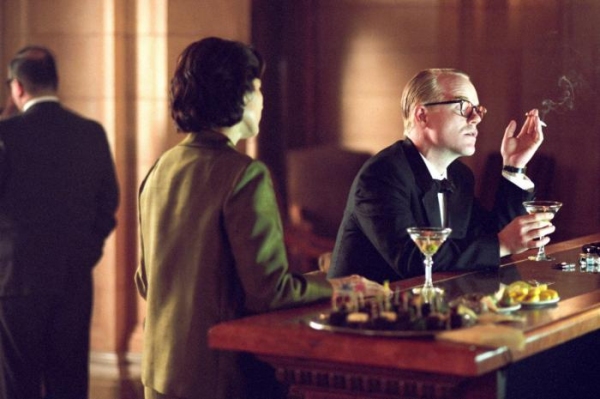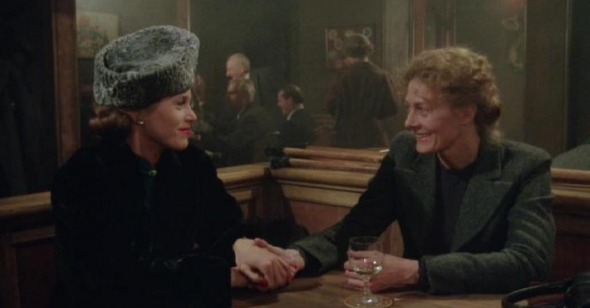An Eponymous Affair
Michael Nordine on Capote and Julia
The biopic occupies a strange place within contemporary cinema, independent or otherwise. Of the many released in the last decade, Capote is in my mind most notable for its understatement. And though the daisy chain of mononymous films can be traced back further than 1977's Julia, Fred Zinnemann's film based on playwright Lillian Hellman's memoir Pentimento provides a useful lens through which to view the current state of its extended cinematic family, especially Bennett Miller's 2005 portrait of the jet-setting author of In Cold Blood. Capote was neither the first nor last biopic so unimaginatively titled; recent films carrying on this tradition range from art-house (Carlos, Che) to multiplex fare (Alexander, Ali), but Miller's was the first in a long while to play into this trend while transcending most others. It sits largely on the shoulders of its star-turned-Oscar winner (as did Ray the year preceding and The Last King of Scotland the year following), was an otherwise modest undertaking from the boutique branch of a large studio (Sony Pictures Classics), and has seemingly been forgotten by the lion's share of critics who almost unanimously embraced it upon its release.
All this is to say that, on paper, Capote does not distinguish itself. That the film is imbued with such gravitas despite its unremarkable premise and conception can be explained most readily by its performances. Any late-for-the-party praise for Philip Seymour Hoffman's performance as the author of In Cold Blood would at this point be redundant; suffice to say the adulation heaped upon him was well-earned. Just as notable—and far less lauded—is Clifton Collins, Jr., whose performance as Perry Smith, one of the two drifters whose murder of an entire Kansas family inspired Truman's book, seemed poised to make the young actor a star but was forgotten shortly thereafter.
Julia, too, is largely performance-driven. Such a film would never have come from anywhere else but a studio in the pre-Sundance 1970s, and Zinneman's film emerged from 20th Century Fox as a fairly middle-of-the-road star vehicle for Jane Fonda. Not unlike Capote, however, it's less a one-star show and more an exploration of a nuanced relationship between two kindred spirits —Fonda as Lillian (or Lilly, as she's called) and Vanessa Redgrave as Julia, her lifelong friend who, over the course of the film, becomes lost to her.
If the two films are to be judged on the strengths of these respective relationships, Capote seems the more compelling of the two. This is no fault of Julia's stars; Redgrave in particular is exceptional in her portrayal of the film’s titular student-turned-radical. Rather, it's due to the fact that, unlike Julia, Capote focuses more on its characters than the goings on surrounding them. In the former, characters get lost in the maelstrom of history; the actual murders that serve as the catalyst for Capote's book are of secondary importance to their eventual effect on the author. Truman is a man who wears his most sympathetic qualities on his sleeve while attempting to hide his demons within his prose. For all his success among the literati of New York, it's clear that the openly homosexual author carries his troubled upbringing in the south around with him, and herein lies the basis of his complicated affinity for Perry: both were abandoned by their mothers. “It's as if Perry and I grew up in the same house and one day he stood up and went out the back door while I went out the front,” Truman says late in the film. Truman's is a lost and lonely soul, and it finds its equal in the withdrawn loner to whom the writer is instantly drawn. But this is also the cause of his central conflict: Truman can't finish what he knows will be his masterwork until Perry dies. As such, he is accused both of using and being in love with Perry; neither accusation is wholly unwarranted. Julia’s protagonist, Lilly, as she's known to friends, is similarly guilt-ridden, and for similar reasons: she leads a comfortable, middle-class life while Julia absconds to Europe in order to resist the rising dual tides of fascism and Nazism. Each couple is ultimately ruptured by the death of one of its halves, putting an end to the balancing act that centers each film. There’s much grief to be had here, and the manner in which each film evokes it is admirably restrained.
Lilly is in the shadow of her partner Dashiell Hammett at the outset of Julia, and it isn't until later that she breaks into the spotlight with her play The Children's Hour. “I like being famous,” she says as if channeling Truman's stream of consciousness. He is a man who predicts that In Cold Blood will be the nonfiction work of the decade before he's written a single word of it; she is a woman whose first impulse upon succeeding is to buy a sable coat. Both enjoy the fruit of their labors and use it to distract them from their sorrow. The “nonfiction novel” (a genre Truman claims to have invented) likely took as many years off Capote's life as it did to write, this due largely to the constant stream of interviews he conducted with Perry. (So many scenes consist entirely of the two men talking in small rooms that one could rename the film Capote/Smith.)
Julia's title, on the other hand, doesn't even refer to its true main character. In this way, it feels more deserved, intimating that Julia is the catalyst, the lens through which we are to view Lilly's story. Any side-by-side examination of the two films, however, is as much a study in similarities as in contrasts. These commonalities range from the superficial—both are biopics of well-known and roughly contemporary American writers; both are aesthetically understated and monochrome; both title characters won Oscars for their performances—to the more revealing: both tell of fractured spirits and loss.
If one thing has changed in the ensuing years, it's the portrayal of writers. Where Zinnemann offers a more classical rendition of a wordsmith—sessions at the typewriter complete with the words THE END at the bottom of a transcript, cigarette dangling from mouth—Miller omits the creative process almost entirely. In so doing, he makes a stronger case for his central subject's brilliance. Because we never see Truman rejecting an early draft of his book (as we do Lilly with her plays), there's never any reason to consider him anything less than the literary wunderkind he presents himself as. Truman has just as many demons as Lilly, but he’ll sooner drink himself silly than let them affect his turns of phrase.
This contrast is indicative of a fundamental and telling difference between the two films: Julia is, by comparison, a rough-and-tumble affair lacking Capote’s aesthetic coherence. Flashbacks are interspersed throughout the main narrative of the former (always with a whimsical sense of nostalgia for the way things once were) while Capote is streamlined, linear, and concise. Colored in greys that pierce its exteriors and travel to the core of its characters, Miller’s film speaks for itself. Conversely, Lilly's narration in Julia seems clumsily intent on reminding us of the film's merits. This difference is even present in the music: Julia's is used to heighten tension; Capote's quiet piano chords almost seem intent on softening it.
This relatively narrow scope allows for a thorough examination of its own ideas, the result being a hauntingly in-depth character study. Conversely, Julia's ambition sometimes exceeds its grasp. It uses its writerly sensibilities as a conduit for (sometimes middling) political intrigue during the interwar period. Its biggest problem, then, isn't even that its many pieces don't come together in any satisfying way (and not in the unintentional, free-floating manner attempted too often today); it's that the potential for Lilly and Julia's dynamic to become genuinely compelling is wasted when the relationship takes a backseat to Europe as a whole. Where Capote puts Truman and Perry in the same room together for what feels like half the film, Lilly spends much of her time hunting Julia down. A central scene in which the she finally finds her proves to be one of the film's best. Zinnemann avoids making the scene climactic or even cathartic, instead using the brief moment as an opportunity to underscore his characters' anguish—even though, as before, it remains largely unspoken. Only Julia aims for (and achieves) a “sweeping” sense of the ways its two leads are inextricably linked. In spite of this, Truman and Perry become so fascinating as to take on the status of specimens observed through glass while Julia and Lilly are embodiments of a historical shift rather than fully formed personalities.
“People recall first impressions,” Perry says to Truman after seeing what he considers an indecent photo of the author on one of his book covers. It is not without a note of unintended irony, then, when their relationship sours over the title of In Cold Blood. In so naming his work—and denying that he's done so—it's as though Perry's sole defender is poisoning the well before readers have even turned to the first page. If only Miller had taken this lesson on the importance of titling a work carefully, Capote might have avoided its initial appearance as something less than it is: simply another biopic. Miller's film is humble in intent but assured in execution; Zinnemann's is lofty but sometimes falls short. Too often he looks past Fonda and Redgrave to focus his gaze on the political crises transpiring around them, failing to put into practice the old adage that “all politics is personal.” Capote's lens, though lacking the same breadth of Julia's, reveals an entirely remarkable depth of field.

